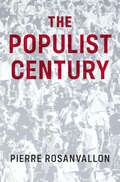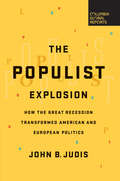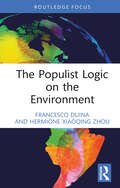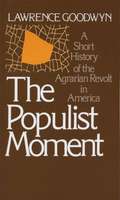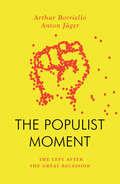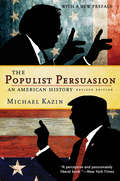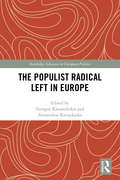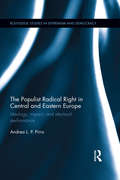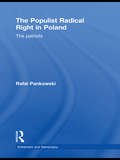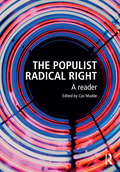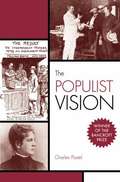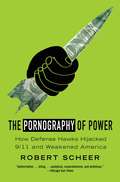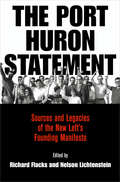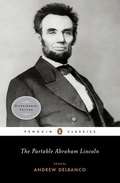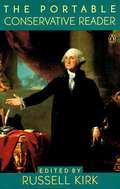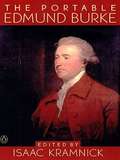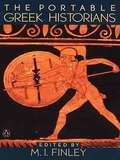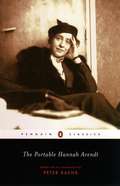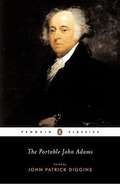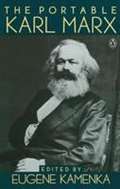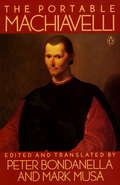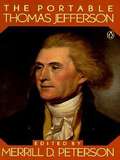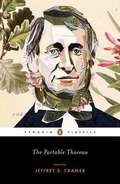- Table View
- List View
The Populist Century: History, Theory, Critique
by Pierre RosanvallonPopulism is an expression of anger; its appeal stems from being presented as the solution to disorder in our times. The vision of democracy, society, and the economy it offers is coherent and attractive. At a time when the words and slogans of the left have lost much of their power to inspire, Pierre Rosanvallon takes populism for what it is: the rising ideology of the twenty-first century. In The Populist Century he develops a rigorous theoretical account of populism, distinguishing five key features that make up populist political culture; he retraces its history in modern democracies from the mid-nineteenth century to the present; and he offers a well-reasoned critique of populism, outlining a robust democratic alternative. This wide-ranging and insightful account of the theory and practice of populism will be of great interest to students and scholars in politics and the social sciences and to anyone concerned with the key political questions of our time.
The Populist Explosion: How the Great Recession Transformed American and European Politics
by John B. JudisPopulism is on its biggest run since the Second World War, in the United States (Tea Party, Occupy Wall Street, Bernie Sanders, Donald Trump); France (National Front); Britain (United Kingdom Independence Party); Finland (Finns Party), Denmark (People's Party) and more on the right; Spain (Podemus), Italy (Five Star Movement), Greece (Syriza) and others on the left. These movements and candidates are an early warning sign of the breakup of the political consensus that has reigned in the U.S. and Europe since the 1980s. How did the Great Recession help reawaken such a disparate but powerful framework of political appeal all across the Atlantic? Veteran political reporter John Judis offers a coherent big picture of how we got here that every reader of politics no matter their party affiliation will need to read.
The Populist Logic on the Environment (Transforming Environmental Politics and Policy)
by Francesco Duina Hermione Xiaoqing ZhouThe Populist Logic on the Environment provides a framework that draws from populism’s essence to explain populist politicians’ approaches to the environment. Over the past few decades, populism has spread across the world – particularly in Europe, but also notably in the US, South America, and Asia. Its essential features – especially its ideological 'thinness' – mean that we can observe considerable variations across populists in their environmental stances. This holds across the political spectrum from the left to the right, despite the traditional tendency of right-wing parties to be skeptical of pro-environmental positions and of left-wing parties to subscribe to them. Regardless of variations, however, ‘true populists’ can be expected to consistently anchor environmental stances in people-centrism and anti-elitism – in ways linked to additional party-specific factors. This book systematizes analytically what the literature observes, corrects some of its empirical limitations, and allows for reflection on the commitment by any one populist party to the environment. The authors undertake a cross-regional analysis of four case studies to illustrate their argument: Marine Le Pen’s National Rally in France, the US Republican Party led by Donald Trump, Spain’s Podemos led by Pablo Iglesias, and Hugo Chávez and Nicolás Maduro’s socialist regime in Venezuela. This book will appeal to scholars and students of political science, public policy, environmental studies, sociology, and geography, as well as a general audience interested in populism and the environment.
The Populist Moment: A Short History Of The Agrarian Revolt In America
by Lawrence GoodwynThis condensed version of Lawrence Goodwyn's Democratic Promise, the highly-acclaimed study on American Populism which the Civil Liberties Review called "a brilliant, comprehensive study," offers new political language designed to provide a fresh means of assessing both democracy andauthoritarianism today.
The Populist Moment: The Left After the Great Recession (Jacobin)
by Anton Jager Arthur BorrielloA Left-wing populist insurgency exploded across the West in the wake of the Great Financial CrisisAfter decades of retreat, the last decade saw a left resurgence from the US to Western Europe and the Mediterranean. This revival of anti-establishment left-wing candidates was not only left but also populist. Though in most cases these movements ran out of steam before effectively being in a position wield state power, many of the parties and figures associated with this wave of left populism have entered government and others are still contesting high office.Providing a blow-by-blow history of the rise and defeat of left electoral movements in the West, Boriello and Jaeger guide us through the conditions that shaped this wave of insurgencies. These include extreme and rising inequality, the collapse of civic life, and a lack of trust in traditional institutions.In this context, Boriello and Jaeger argue that some or another form of populism was all but inevitable. And, despite defeats, left offensives of present and future will be populist in nature. This is because the conditions that shaped the first left populist wave are still very much with us.
The Populist Persuasion: An American History
by Michael Kazin"Kazin has written a thoughtful and important book on one of the more consequential movements in American politics-populism. Tracing the emergence of populist campaigns from the 19th century to the present day, he looks at such movements as the labor movement, the prohibitionist crusade, Catholic radio populist Father Coughlin, the New Left, and the recent advance of conservative populism, as identified with such figures as George Wallace and Ronald Reagan. Kazin opens by saying, 'I began to write this book as a way of making sense of a painful experience: the decline of the American Left, including its liberal component, and the rise of the Right.' Anyone interested in either political tendency will find this book both informative and engaging. It is a powerful, elegantly written, and observant study that never fails to retain the reader's interest."--Library JournalFor the revised Cornell edition, Michael Kazin has rewritten the final chapter, bringing his coverage of American populism up to the 1996 presidential election, and he has added a new conclusion.
The Populist Persuasion: An American History
by Michael KazinIn The Populist Persuasion, the distinguished historian Michael Kazin guides readers through the expressions of conflict between powerful elites and "the people" that have run through our civic life, filling it with discord and meaning from the birth of the United States until the present day. Kazin argues persuasively that the power of populism lies in its adaptable nature. Across the political spectrum, commentators paste the label on forces and individuals who really have just one big thing in common: they are effective at blasting "elites" or "the establishment" for harming the interests and betraying the ideals of "the people" in nations that are committed, at least officially, to democratic principles. Kazin’s classic book has influenced debates over populism since its publication. The new preface to this edition brings the story up to date by charting the present resurgence of populist discourse, which was front and center in the 2016 elections and in the Brexit debate.
The Populist Radical Left in Europe (Routledge Advances in European Politics #1)
by Alexandros Kioupkiolis Giorgos KatsambekisBuilding on a comprehensive theoretical framework that draws on discursive and ideational approaches to populism, this volume offers a comparative mapping of the Populist Radical Left in contemporary Europe. It explores the novel discursive, political and organisational features of several political actors, as well as the conditions of their emergence and success, while being alert to the role of relevant social movements. Chapters feature case studies of the Greek party Syriza, the Spanish Podemos, the German Die Linke, Jean-Luc Mélenchon and France Insoumise, the Dutch Socialist Party and the Slovenian Levica. Jeremy Corbyn’s leadership of Labour in the UK and ‘Momentum’, the movement that supports him is also examined. A separate chapter is devoted to recent grassroots social movements that can be seen as instances of progressive populism, such as the ‘squares movement’ in Spain and Greece. This book fills a crucial gap in the literature on radical left politics and populism in Europe, contributing to the rapidly burgeoning field of populism studies.
The Populist Radical Right and Health: National Policies and Global Trends
by Scott L. Greer Michelle FalkenbachThis contributed volume is the first in-depth analysis of the health policies of populist radical right (PRR) parties worldwide and their actual involvement in health care. The prominence of authoritarian, nationalistic, and populist parties is expanding steadily. However, it is often difficult to discern what kind of policies they really stand for, particularly with regard to the welfare state and public health, where research remains sparse. This book fills this critical gap. The text connects PRR parties and leaders with actual health and social policy effects in Eastern and Western Europe as well as in the United States, Brazil, and the Philippines. The chapters highlight ten individual country case studies authored by young scholars and professors with political science and health experts: The Austrian Freedom Party in Government: A Threat to Public Health? The Alternative for Germany (AfD) and Health Policy: Normalization or Containment of Populist Radical Right Tendencies? Populist Radical Right Influence on Health Policy in the Netherlands: The Case of the Party for Freedom (PVV) The Evolution of the Populist Radical Right and Their Impact on Health in Italy The Populist Radical Right and Health in Hungary Is the Polish 'Law and Justice' (PiS) a Typical Populist Radical Right Party? A Health Policy Perspective The Case of the United Kingdom Independence Party (UKIP) Rhetoric and Reality in the United States of America: Trump, Populism, and Health Policy Ruling Through Chaos in Brazil: Bolsonaro's Authoritarian Agenda for Public Health An Authoritarian Reaction to COVID-19 in the Philippines: A Strong Commitment to Universal Health Care Combined with Violent Securitization The Populist Radical Right and Health is exceptionally timely and essential reading for political science and health colleagues researching and writing about PRR parties and leaders; students and faculty in public health, health and social policy, and political science; and anyone interested in learning more about this topic.
The Populist Radical Right in Central and Eastern Europe: Ideology, impact, and electoral performance (Extremism and Democracy)
by Andrea L. PirroOften neglected in the study of far right organisations, post-communist Europe recently witnessed the rise and fall of a number of populist radical right parties. The Populist Radical Right in Central and Eastern Europe is the first comparative study to focus on the ideology, impact, and electoral performance of this party family in the region. The book advances a series of arguments concerning the context and text of these parties, and systematically analyses the supply-side and demand-side of populist radical right politics. Whilst populist radical right parties in Central and Eastern Europe maintain broad similarities with their West European counterparts, they come across as a distinct phenomenon worthy of study in their own right. Parties like Ataka (Bulgaria), Jobbik (Hungary), and the SNS (Slovakia) resort to historical legacies and contextual idiosyncrasies to frame their ideology; interact with other parties over a number of policy areas; and ultimately compete for public office on the basis of their nativist agenda. The book provides a novel framework for the analysis of different aspects of populist radical right politics, notably enhancing the understanding of this phenomenon by means of primary data such as personal interviews with party leaders and original expert surveys. Using the ideological features of these parties as an overarching analytical tool, this book is essential reading for students and scholars researching the far right, post-communist issues and European politics in general.
The Populist Radical Right in Poland: The Patriots (Extremism and Democracy)
by Rafal PankowskiIn this important and accessible study, Rafal Pankowski makes sense of the rapid growth of organized radical nationalism on the political level in Poland by showing its origins, its internal dynamics and the historical, political, social and cultural context that has made it possible. From political obscurity to the heart of mainstream politics, the recent rise of the extreme right in the Polish context surprised many observers. In the 1990s Poland was usually referred to as a country without significant extremist or populist movements. It was considered to be a stable, even if young, democracy, and ‘extremists’ were perceived as just a little nuisance to the liberal-democratic consensus. By the mid-2000s, the picture changed completely, two populist radical right parties entered into a coalition government with the right-wing conservative Law and Justice Party. All of a sudden, racist extremist affiliations were not a hindrance to a high-level career, but were tolerated or even seemed positively valued. The entrance of extremists into state structures was no longer a matter of isolated individual cases, but took on systemic features. Presenting a detailed analysis of the Polish national populism, the book will use theories of social movements (in particular the concept of discursive opportunity structure), as well as relevant theories of transition and democratization. In particular, the specific cultural resources of Polish nationalist populism are to be analyzed because they are deemed to be among principal reasons for the relative success of the radical nationalists and their particular brand of identity politics The book not only provides a detailed analysis of Polish nationalism but will also have a much broader trans-national significance, essential reading for scholars of national populism in the context of post-communism and beyond.
The Populist Radical Right: A Reader (Routledge Studies in Extremism and Democracy)
by Cas MuddeThe populist radical right is one of the most studied political phenomena in the social sciences, counting hundreds of books and thousands of articles. This is the first reader to bring together the most seminal articles and book chapters on the contemporary populist radical right in western democracies. It has a broad regional and topical focus and includes work that has made an original theoretical contribution to the field, which make them less time-specific. The reader is organized in six thematic sections: (1) ideology and issues; (2) parties, organizations, and subcultures; (3) leaders, members, and voters; (4) causes; (5) consequences; and (6) responses. Each section features a short introduction by the editor, which introduces and ties together the selected pieces and provides discussion questions and suggestions for further readings. The reader is ended with a conclusion in which the editor reflects on the future of the populist radical right in light of (more) recent political developments – most notably the Greek economic crisis and the refugee crisis – and suggest avenues for future research.
The Populist Vision
by Charles PostelThe Populist movement has been both dismissed as an irrational response of backward-looking farmers to modernity and romanticized as a resistance movement of tradition-based communities to modern, commercial society. Now, in a wide-ranging and provocative reassessment, based on a deep reading of archival sources, The Populist Vision argues the opposite - that the Populists understood themselves as, and in fact were, modern people, pursuing an alternative vision for modern America. Taking into account the leaders and the led, The Populist Vision uses a wide lens - focusing on the farmers, both black and white, men and women - but also looking at wage workers and bohemian urbanites. Ranging from Texas to the Dakotas, from Georgia to California, Charles Postel shows how farmer Populists strove to use the new innovations for their own ends. They sought scientific and technical knowledge, formed highly centralized organizations, launched large-scale cooperative businesses, and pressed for reforms on the model of the nation's most elaborate bureaucracy - the Postal Service. Hundreds of thousands of women joined the movement, too, seeking education, employment in schools and offices, and a more modern life. Miners, railroad workers, and other labor Populists joined with farmers to give impetus to the regulatory state. Activists from Chicago, San Francisco, and other new cities provided Populism with a dynamic urban dimension. The winner of a prestigious Bancroft Prize and the Organization of American Historian's Frederick Jackson Turner Award, this highly original account of the Populist movement is essential reading for anyone interested in the politics, society, and culture of modern America.
The Pornography of Power: How Defense Hawks Hijacked 9/11 and Weakened America
by Robert ScheerIn the course of his forty-year-career as one of America's most admired journalists, Robert Scheer's work has been praised by Gore Vidal, Susan Sontag, and Joan Didion, who deems him "one of the best reporters of our time." Now, Scheer brings a lifetime of wisdom and experience to one of the most overlooked and dangerous issues of our time - the destructive influence of America's military-industrial complex. Scheer examines the expansion of our military presence throughout the world, our insane nuclear strategy, the immorality of corporations profiting in Iraq, and the arrogance of our foreign policy. Although Scheer is a liberal, his view echoes that of former Republican president General Dwight Eisenhower, who, in his farewell speech to the American people, spoke prophetically about need to guard against the growing influence of the military-industrial complex. In George W. Bush's America, politicians like Ike and Richard Nixon seem like prudent centrists. The views of libertarians, liberals, and pacifists are often overlooked or ignored by America's mainstream media. The Pornography of Power is the culmination of a respected journalist's efforts to change the terms of debate. At a time when many are exploiting fears of terrorist attacks and only a few national leaders are willing to advocate cuts in defense spending, nuclear disarmament, and restrained use of American force, Robert Scheer has written a manifesto for enlightened reform.
The Port Huron Statement
by Richard FlacksThe Port Huron Statement was the most important manifesto of the New Left student movement of the 1960s. Initially drafted by Tom Hayden and debated over the course of three days in 1962 at a meeting of student leaders, the statement was issued by Students for a Democratic Society as their founding document. Its key idea, "participatory democracy," proved a watchword for Sixties radicalism that has also reemerged in popular protests from the Arab Spring to Occupy Wall Street. Featuring essays by some of the original contributors as well as prominent scholars who were influenced by the manifesto, The Port Huron Statement probes the origins, content, and contemporary influence of the document that heralded the emergence of a vibrant New Left in American culture and politics. Opening with an essay by Tom Hayden that provides a sweeping reflection on the document's enduring significance, the volume explores the diverse intellectual and cultural roots of the Statement, the uneasy dynamics between liberals and radicals that led to and followed this convergence, the ways participatory democracy was defined and deployed in the 1960s, and the continuing resonances this idea has for political movements today. An appendix includes a complete facsimile of the original document. The Port Huron Statement offers a vivid portrait of a unique moment in the history of radicalism, showing that the ideas that inspired a generation of young radicals more than a half a century ago are just as important and provocative today. Contributors: Robert Cohen, Richard Flacks, Jennifer Frost, Daniel Geary, Barbara Haber, Grace Elizabeth Hale, Tom Hayden, Michael Kazin, Nelson Lichtenstein, Jane Mansbridge, Lisa McGirr, James Miller, Robert J. S. Ross, Michael Vester, Erik Olin Wright.
The Portable Abraham Lincoln
by Abraham LincolnCelebrate the bicentennial of Abraham Lincoln's birth with this new edition of his greatest speeches and writings Abraham Lincoln endowed the American language with a vigor and moral energy that has all but disappeared from today's public rhetoric. Lincoln's writings are testaments of our history, windows into his enigmatic personality, and resonant examples of the writer's art. The Portable Abraham Lincoln contains the great public speeches-the first debate with Stephen Douglas, the "House Divided"speech, the Gettysburg Address, the Second Inaugural Address-along with less familiar letters and memoranda that chart Lincoln's political career, his evolving stand against slavery, and his day-to-day conduct of the Civil War. This edition includes a revised introduction, updated notes on the text, a chronology of Lincoln's life, and four new selections of his writing. .
The Portable Conservative Reader
by Russell KirkThe Portable Conservative Reader illuminates the meaning of the conservative cause. In one of the most wide-ranging and thoughtful anthologies of conservative thought in the English and American traditions, Russell Kirk excavates conservatism's foundations. The breadth of conservative writing reveals that, at bottom, the conservative idea is not an economic theory nor a political program but a penetrating way of looking at the human condition. Here, Kirk brings together a diverse group of thinkers and material - including essays, poetry, and fiction - that articulate the conservative imagination, its veneration of tradition, prudence, variety, and the enduring fallibility and imperfectibility of mankind. These selections set forth basic premises and principles at work in the minds of Edmund Burke, Benjamin Disraeli, and T. S. Eliot in Britain, Alexander Hamilton, Nathaniel Hawthorne, Henry Adams, and Irving Kristol in America, and many more who have elucidated this turn of mind. This balanced and surprising collection is a landmark study of the most potent political force of our time.
The Portable Edmund Burke
by Edmund Burke Isaac KramnickThe intellectual wellspring of modern political conservatism, Edmund Burke is also considered a significant figure in aesthetic theory and cultural studies. As a member of the House of Commons during the late eighteenth century, Burke shook Parliament with his powerful defense of the American Revolution and the rights of persecuted Catholics in England and Ireland; his indictment of the English rape of the Indian subcontinent; and, most famously, his denouncement of English Jacobin sympathizers during the French Revolution. The Portable Edmund Burke is the fullest one- volume survey of Burke's thought, with sections devoted to his writings on history and culture, politics and society, the American Revolution, Ireland, colonialism and India, and the French Revolution. This volume also includes excerpts from his letters and an informative Introduction surveying Burke's life, ideas, and his reception and influence in the nineteenth and twentieth centuries. .
The Portable Greek Historians
by M. I. FinleyEssential passages from the works of four "fathers of history"--Herodotus's History, Thucydides' History of the Peloponnesian War, Xenophon's Anabasis, and Polybius's Histories.
The Portable Hannah Arendt
by Hannah ArendtThis biography includes generous selections from The Origins of Totalitarianism, The Human Condition, and her controversial Eichmann in Jerusalem. It also includes selection of Arendt's letters to other formative thinkers of the century.
The Portable John Adams
by John Adams Jack DigginsIn addition to being an uncompromising defender of liberty, esteemed diplomat, and successor to George Washington, John Adams was a passionate and prolific writer. Adams biographer John Patrick Diggins gathers an impressive variety of his works in this compact, original volume, including parts of his diary and autobiography, and selections from his rich correspondence with this wife, Abigail, Thomas Jefferson, and others. The Portable John Adams also features his most important political works: "A Dissertation on Canon and Feudal Law," "Thoughts on Government," "A Defense of Constitutions," "Novanglus," and "Discources in Davila." There is no finer introduction to the protean genius of this seminal American philosopher. First time in Penguin Classics
The Portable Karl Marx
by Karl Marx Eugene KamenkaIncludes the complete Communist Manifesto and substantial extracts from On the Jewish Question, the German Ideology, Grundrisse, and Capital, a broad representation of his letters, and lesser-known works, especially his long-unavailable, early works.
The Portable Machiavelli
by Niccolo Machiavelli Mark Musa Peter BondanellaIn the four and a half centuries since Machiavelli's death, no single and unanimously accepted interpretation of his ideas has succeeded in imposing itself upon the lively debate over the meaning of his works. Yet there has never been any doubt about the fundamental importance of Machiavelli's contribution to Western political theory. The Portable Machiavelli brings together the complete texts of The Prince, Belfagor, and Castruccio Castracani, newly translated by Peter Bondanella and Mark Musa especially for this volume. In addition, the editors include an abridged version of The Discourses; a play, The Mandrake Root, in its entirety; seven private letters; and selections from The Art of War and The History of Florence.
The Portable Thomas Jefferson
by Thomas JeffersonIncludes A Summary View of the Rights of British America and Notes on the State of Virginia complete; seventy-nine letters; "Response to the Citizens of Albemarle," 1790; "Opinion on the Constitutionality of a National Bank," 1791; and many other writings.
The Portable Thoreau
by Henry David Thoreau Jeffrey S. CramerHenry David Thoreau dedicated his life to preserving his freedom as a man and an artist. Nature was the fountainhead of his inspiration and his refuge from what he considered the follies of society. Heedless of his friends’ advice to live in a more orthodox manner, he determinedly pursued his own inner bent, which was that of a poet-philosopher, in prose and verse. Carl Bode brings together the best of Thoreau’s works in The Portable Thoreau, a comprehensive collection of the writings of a unique and profoundly influential American thinker. The complete texts of Thoreau’s classic works Walden and “Civil Disobedience,” as well as selections from The Maine Woods, Cape Cod, the Journal, and eighteen poems are included. Bode’s introduction rounds out this compact volume, offering a thorough and informative analysis of Thoreau and the forces that shaped his life and writing. “This compact book, containing infinite riches in a little room, is a simple setting for sound sense, nugget-like thought, the refined essences of a point of view” — St. Louis Post-Dispatch .
